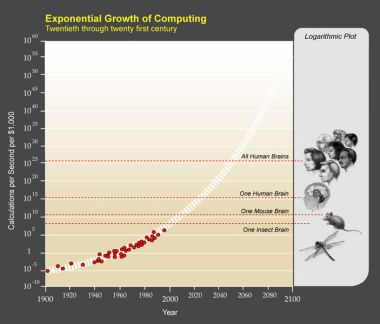Answer
Isn’t technical progress on specific projects essentially unpredictable?
Predicting specific projects is indeed not feasible. But the result of the overall complex, chaotic evolutionary process of technological progress is predictable.
People intuitively assume that the current rate of progress will continue for future periods. Even for those who have been around long enough to experience how the pace of change increases over time, unexamined intuition leaves one with the impression that change occurs at the same rate that we have experienced most recently. From the mathematician’s perspective, the reason for this is that an exponential curve looks like a straight line when examined for only a brief duration. As a result, even sophisticated commentators, when considering the future, typically use the current pace of change to determine their expectations in extrapolating progress over the next ten years or one hundred years. This is why I describe this way of looking at the future as the “intuitive linear” view. But a serious assessment of the history of technology reveals that technological change is exponential. Exponential growth is a feature of any evolutionary process, of which technology is a primary example.

The increase in computer power has been exponential and will probably continue to be in the future. The image is excerpted from the author's book with his permission. Click to enlarge.
As I show in the book
The singularity is near: When humans transcend biology, this has also been true of biological evolution. Indeed, technological evolution emerges from biological evolution. You can examine the data in different ways, on different timescales, and for a wide variety of technologies, ranging from electronic to biological, as well as for their implications, ranging from the amount of human knowledge to the size of the economy, and you get the same exponential—not linear—progression. I have over forty graphs in the book from a broad variety of fields that show the exponential nature of progress in information-based measures. For the price-performance of computing (i.e. how well a computer can perform, considering it's price), this goes back over a century, well before Gordon Moore, cofounder of Intel and formulator of
Moore's law, was even born.
Aren’t there are a lot of predictions of the future from the past that look a little ridiculous now?
Any number of bad predictions from other futurists in earlier eras can be cited to support the notion that we cannot make reliable predictions. In general, these prognosticators were not using a methodology based on a sound theory of technology evolution. I say this not just looking backwards now. I’ve been making accurate forward-looking predictions for over twenty years based on these models.
But how can it be the case that we can reliably predict the overall progression of these technologies if we cannot even predict the outcome of a single project?
Predicting which company or product will succeed is indeed very difficult, if not impossible. The same difficulty occurs in predicting which technical design or standard will prevail. For example, how will the wireless-communication protocols Wimax, CDMA, and 3G fare over the next several years? However, as I argue extensively in the book, we find remarkably precise and predictable exponential trends when assessing the overall effectiveness (as measured in a variety of ways) of information technologies. And as I mentioned above, information technology will ultimately underlie everything of value.
But how can that be?
We see examples in other areas of science of very smooth and reliable outcomes resulting from the interaction of a great many unpredictable events. Consider that predicting the path of a single molecule in a gas is essentially impossible, but predicting the properties of the entire gas—comprised of a great many chaotically interacting molecules—can be done very reliably through the laws of thermodynamics. Analogously, it is not possible to reliably predict the results of a specific project or company, but the overall capabilities of information technology, comprised of many chaotic activities, can nonetheless be dependably anticipated through what I call
the law of accelerating returns.




